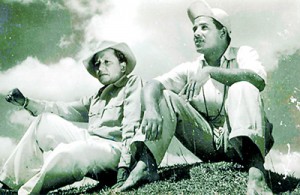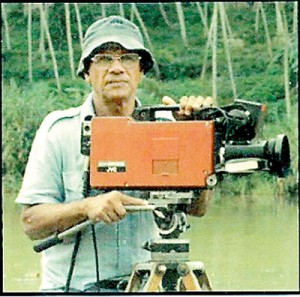Our father made all his dreams come true
On November 16, 1922 in the small town of Kandy, Ethel Van Heer and engine driver William Alexander Blake Snr welcomed their first child. On May 17 this year, 92 years and 6 months later, we said farewell to William Alexander Blake Junior.

Two masters of the silver screen: Lester James Peries (left) and Willie Blake. Pic courtesy Ajith Galappaththi
As an adolescent he was sent away to study at boarding school – Trinity College in the city of Kandy. Here Willie discovered boxing (he captained the team) and a passion for the arts. Movies were screened in a mobile tent that travelled from town to town. Whenever a tent went up, there went Willie. When he should have been studying, he snuck away to hang out at the movies with his celluloid Hollywood heroes – John Wayne, Gary Cooper and Humphrey Bogart.
Following his graduation he joined the Navy and, when World War II ended, he joined the Ceylon Government Railway security service. Then, KaBoom!,Willie got sidetracked: he was smitten by Yvonne, the beautiful daughter of Frederick(Sonny) and Lilian Hardy, and subsequently married her.
Now a family man, he joined the Government Film Unit as a cameraman. The routine of grinding out propaganda reels bored him but it provided security to his growing family. All the while, though, Willie made use of his Brownie Box camera to snap, snap, snap.“Say Cheese!”,Valleri, Melanie and Sandra!
Then in the early 50’s,much to the horror of his mother and new wife, he jettisoned the security of a government pay cheque and pension and accepted an offer to work as a cameraman with another young filmmaker, Lester James Peries. And so the partnership that changed the course of Sinhala cinema was born.

Willie Blake
Prior to this, films were made in South Indian studios and shot indoors on sets. Lester and Willie sought to abandon the gaudy film studio sets of Madras so their film crew moved outdoors. Their first movie “Rekava” broke new ground, shot entirely on location using natural light. It was nominated for the ‘Palm d’Or’ at the Cannes Film Festival in 1957.
Willie loved the jungle and worked on the movies “Tarzan” and Sri Lanka’s own “God King”. When the film “Bridge on the River Kwai” was shot outdoors in the steamy, dense, tropical jungles of Ceylon, Willie was an integral part of the camera unit. ‘BORK’ got a nod for eight Academy Award nominations, and went on to win a record seven; Cinematography was one of them. An invitation to ride into the Hollywood hills arrived, but Willie chose to remain in Sri Lanka. This was not so good for us kids as it resulted in us having to spend all our vacations swinging from vine to vine in the jungles, sleeping in huts and tents with wild elephants, leopards, crocodiles, pythons and cobras lurking around.
On one of our jungle vacations, the ancient(‘hmm…Classic’) car we were travelling in predictably broke down in a place called Rugam near the east coast. Due to a lack of car repair shops in the jungles (something we faced often on our jungle adventures), we had to set up camp there. When fearless Willie discovered that Rugam was for sale, he fell in love and the purchase was made. “Jeanville Rugam” included two pet monkeys, a mongoose and two stray dogs and a beautiful ocean close by for swimming. Now Rugam became the place where we –frequently joined by our cousins, aunts and uncles – spent all vacations. The same adventures continued, but with a smaller chance of car malfunctions. And Rugam is the inheritance Willie has left his four grandsons.
Willie’s passion for the jungles continued in our little city flat in Colombo; while our neighbours’ kids had pet fish, puppies and kittens, we had a full grown leopard with claws and fangs, who could kill instantly. Shortly after Sam the leopard took up residence, the civil unrest began. Willie’s favourite river, the Mahaweli, was flowing with bodies and blood and we immigrated to Canada.
In our new home, Willie had to switch careers, his toughness and fearlessness served him well, as he conformed to the life of a new immigrant and took on a job as security guard. This didn’t last long as luck would have it, the Thomas Craven Film Corporation in New York, whom he’d worked with in Sri Lanka, provided him the opportunity to continue with his passion for filming.
He travelled to many locations around the world and was commissioned to film an interview in a maximum prison cell of a disillusioned US military contract worker who became a spy for the Soviet Union; we know the characters better in the Hollywood version of it, “The Falcon and the Snowman”.
Some of Willie’s other accomplishments were:
Capturing for the first time on celluloid the total eclipse of the sun.
Filming many documentaries worldwide for UNICEF and the World Health Organisation.
Being invited by his alma mater, Trinity College, to receive the prestigious Trinity Lion award, awarded for the first time in the field of cinematography
Receiving an award from the Sri Lanka National Film Corporation
Being given a lifetime “Golden Lion Presidential Award” for capturing the ambience and flavour of Sri Lankan life and landscape.
Like any movie soundtrack, the soundtrack to Willie’s life was important – his passion for classical music is well groaned at. We think he was one of the best self-taught students in this discipline.
Willie’s sisters spoilt him all his life in many ways. In fact, we blame them for his finicky eating habits and his belief that he was a demi-god. After the gruesome civil war razed his Rugam paradise to the ground, his nephew, Viren, offered him a new Garden of Eden – he installed Willie as sage-in-residence at the village they built in Ulpotha. Willie poured all the love and passion he had brought to film into his new love. In Willie’s eyes Ulpotha was his to do with as he pleased and EVERYONE let him get away with it. Willie decided where the trees and plants would go, where the paths would be and who should be doing what – when he left for Canada (always temporarily) things reverted to plan. The villagers of Ulpotha took excellent care of Willie – special dishes were prepared for him, 24/7 surveillance was offered gladly when he grew unsteady on his feet; all Willie had to do was reminisce and expound and explain his theories and views on life with the guests. Judging by recent heartfelt Facebook postings, he certainly left his mark with many of those he met. Today “Uncle Willie’s Rock” in Ulpotha stands as a lasting testament to Willie.
Yes, Willie was movies and music but also much more. His family and close friends will tell you he gave freely and generously, and sometimes for no particular reason. He was the driving force behind our love of the road less travelled, and while he argued loudly and often, he held his convictions with passion, often for the underdog. Dad’s daughters are forever grateful for his liberal views on movies, books, music, painting, politics and religion which he passed on. Unfortunately Val and I also inherited the arguing gene but we are trying to learn better control from Sandra. We will forever remember the constant joy Willie took in being surrounded by his favourite music, composers, movies, books and Gaugin prints, lovingly handling his paper and vinyl, savouring his chocolates and revelling in the spectacle of it all!
Ralph Waldo Emerson must have been thinking of Willie when he wrote “Dare to live the life you have dreamed for yourself. Go forward and make your dreams come true.”
Rest in Peace Dad.


